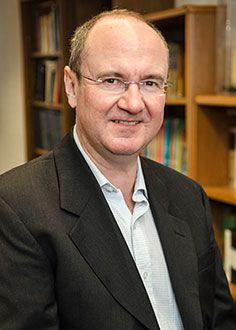
WASHINGTON (April 25, 2013) — The George Washington University (GW) School of Medicine and Health Sciences (SMHS) is pleased to announce that HIV/AIDS researcher, Douglas F. Nixon, M.D., Ph.D., will be joining the faculty on Oct. 1, 2013 as the Ross Professor of Basic Science Research and chair of the department of microbiology, immunology, and tropical medicine.
Nixon has actively pursued immunovirology research for more than 25 years, with his studies spanning from clinical research and human immunology, to basic virology and molecular biology. Over the past two decades, he has focused on the cellular immune response to retrovirus infections and has published extensively on these topics.
“Dr. Nixon is going to be a great addition and an inspiring leader for the department’s faculty, students, and staff. His expansive research portfolio and vast expertise will enable the department to maintain its highly-regarded reputation and expand its signature programs,” said Jeffrey S. Akman, M.D., vice president for health affairs and dean of GW SMHS.
“I am thrilled to be joining George Washington University,” said Nixon. “It is an honor to be appointed chair of the department of microbiology, immunology and tropical medicine (MITM) at GW. MITM is focused on basic, translational, and clinical studies of infectious diseases of poverty, and the current faculty members have already made important advances in the studies of neglected infectious diseases and HIV/AIDS. As MITM moves into the stunning, newly renovated space in Ross Hall at the beginning of 2014, we will recruit additional faculty to help in the fight to eliminate infectious diseases of poverty. We will create within MITM two centers: The Center for the Research of Neglected Infectious Diseases of Poverty and the Center for Basic Research for the Cure and Prevention of HIV/AIDS.”
Most recently, Nixon was a professor of medicine at the University of California, San Francisco, and associate chief of the division of experimental medicine, where he served as the primary mentor for numerous postdoctoral fellows, students, and several National Institutes of Health (NIH) Individual Career Development (K) awardees. He has also held positions at the Gladstone Institute of Virology and Immunology, The Rockefeller University, the Aaron Diamond AIDS Research Center, and the University of Oxford.
Among his many accomplishments, Nixon gained recognition for publishing the first identification of an HIV specific cytotoxic T cell CTL epitope in the journal Nature. In addition, he has published more than 190 articles in peer-reviewed journals, including first- or senior-author publications in Nature, PNAS, Journal of Clinical Investigation, PLoS Pathogens, and holds several patents.
Nixon’s research is funded through grants from the NIH, including an NIH Merit Award, AmfAR, and the Gates Foundation. He is the chair of the NIH AIDS Vaccine Subcommittee, was elected as a scientist of the Elizabeth Glaser Pediatric AIDS Foundation, is a member of the American Society for Clinical Investigation and the Henry Kunkel Society, and delivered the Distinguished Science Lecture in 2009 at the NIH Rocky Mountain Laboratories. Nixon also reviews for many publications, including Nature, Science, and Cell.
Recently, Nixon was named as one of the 2012 POZ 100, which is an elite group of scientists, researchers, advocates, politicians, and celebrities who are recognized by POZ Magazine for their significant contributions to speeding up the end of AIDS.
“Infectious diseases are a global problem, and also manifest at a local level. In Washington, D.C., the prevalence of HIV infection is one of the highest in the nation,” said Nixon. “By studying infectious diseases at a local and global level, research at MITM, in very close collaboration with colleagues throughout GW, can contribute to new discoveries for biomarkers, diagnostics, vaccines, and novel treatments for these diseases. Thus, the mission of MITM is completely aligned with the commitment of GW SMHS to improve the health and well-being of our local, national, and global communities.”


